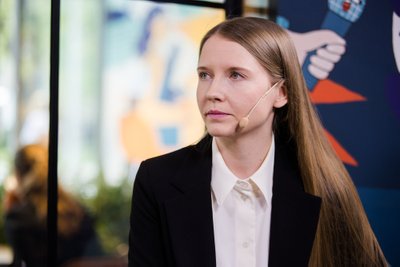On September 27th the bill banning fur farms was signed by Lithuanian President Gitanas Nausėda.
The bill calls for phasing out fur farms in Lithuania by January 1st, 2027.
According to Vaitkevičiūtė, the decision was a long-awaited victory for the supporters of the cause who fought hard for this outcome. This decision means that there will be no fur farms in Lithuania in the future.
“Until 2027 there won’t be any new fur farms opened. As for the proposed compensations, the sooner the farmer withdraws from the market, the bigger the amount they will get. This is a very praiseworthy decision as it aims to close down fur farms as quickly as possible to put an end to the animal cruelty that takes place there,” says Vaitkevičiūtė.
She argues that the animals raised on farms are invasive species and can only be kept for fur or scientific purposes. When the farms are closed the animals will remain in the farmers’ disposition.

The owners of fur farms will be eligible for compensation. Firstly, the farm workers will receive redundancy compensation. Secondly, all costs associated with the equipment and farm buildings’ utilization will be covered. Lastly, the state will provide a specific amount for every individual animal.
“Compensation for loss of profit is determined based on when a farmer leaves the market. If the farm is liquidated the following year, the compensation is €3 per animal. If it is done a year later, the compensation is €2, and if the farmer withdraws during the final year, the compensation is €1. The compensation varies across European countries. In Latvia and Estonia, for example, the winding-up process was not considered eligible for any compensation, while other European countries paid higher amounts. It is important to note that farmers are unlikely to be satisfied with the compensation received,” says Vaitkevičiūtė.
Around one million American minks are bred in Lithuanian fur farms every year. This year the number will possibly be smaller due to some farms carrying out voluntary liquidation processes, and not waiting for the decision by the Seimas. Additionally, there are around 30,000 chinchillas being bred on these farms.
The decision still raises some objections.
On September 21, opponents of the bill claimed that proposed compensation amounts for the farmers were unfairly low.

“Of course, after 30 years some MPs are ready to react to wet hen performances. However, I would like to give a word of advice to fur farm owners: stay calm and don’t pay attention to all this nonsense. Another election is just a year away. Most probably there will be more MPs who won’t be influenced by wet hen performances. All this nonsense will be revoked, and you will be able to continue with your work. Don’t rush to liquidate anything, wait a year. During the last term, we did our best to support businesses, including this one. If you have any information about animals being mistreated or if the Law on Welfare and Protection of Animals is violated, please report it to the authorities, but let’s not punish everyone, and let’s not force everyone to destroy their business,” said Ąžuolas.
However, fur farming has been abolished in developed European countries for quite some time now. The inhumane treatment of animals is not the only concern associated with fur farming. Environmental pollution is another issue that comes with this industry. Livestock farming, in general, is a major source of pollution, and banning one of its sectors can play a significant role in reducing environmental pollution.

